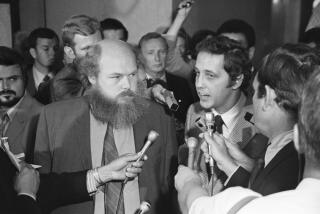Rockefeller impostor ‘continues to maintain his innocence’
This post has been corrected. See the note at the bottom for details.
Defense attorneys for Christian Karl Gerhartsreiter, the Rockefeller impersonator convicted in the 1985 slaying of his landlady’s adult son, said Wednesday that their client had been hopeful of an acquittal.
Gerhartsreiter, 52, strolled into the courtroom smiling, but showed little emotion when the court clerk announced the jury had convicted him of first-degree murder.
Defense attorney Brad Bailey said Gerhartsreiter had previously been optimistic and that he remains hopeful that he will overturn the conviction on appeal.
FULL COVERAGE: Rockefeller imposter on trial
“He’s disappointed and continues to maintain his innocence,” Bailey said minutes after the verdict. “Tomorrow is a new day and new chapter in this case.”
Bailey said that he and others on the defense team saw their client as “someone who had for 30 years tried to transform himself into someone he wanted” to be, rather than a murderer on the run, as the prosecution characterized him.
Defense lawyer Jeffrey Denner said it was clear that Gerhartsreiter had masqueraded as other people for decades, including as Clark Rockefeller.
PHOTOS: Clark Rockefeller investigation
“It doesn’t make him a killer,” Denner said.
Gerhartsreiter faces a maximum life sentence. Throughout the trial, Gerhartsreiter, wearing a blue blazer and slacks, kept his head down, writing continuously as attorneys sparred over evidence.
Prosecutors accused Gerhartsreiter of killing John Sohus in 1985 and burying his body in a 3-foot-deep grave in the backyard of his San Marino home. Sohus, 27, vanished in early 1985 along with his wife, Linda, who has never been found. Gerhartsreiter, who in San Marino introduced himself as British aristocrat Christopher Chichester, disappeared soon afterward, resurfacing on the East Coast under a series of ever more elaborate false identities, including Clark Rockefeller, a scion of America’s famous wealthy family.
The victim’s sister, Ellen Sohus, dabbed her eyes with a tissue after the verdict. “It’s finally over,” she said.
Sohus, who described her late brother as gentle, fun-loving and “the original nerd” who loved gadgets and electronics, said she sat through the trial to show that John Sohus was loved. She was surrounded, she said, by Linda Sohus’ friends, whom she called a source of unexpected support.
John Sohus, she said, “would be so overwhelmed by how many people loved him and how many people were fighting for him.”
More than 40 witnesses testified during the three-week trial in downtown Los Angeles, recounting stories about the charismatic Gerhartsreiter and the missing couple, who had been married less than a year and a half when they disappeared. John’s remains were discovered in 1994 by a construction crew building a swimming pool for the new owner of the Lorain Road property.
Defense attorneys argued that their client was a simple conman who committed only petty crimes. They pointed out that the prosecution had presented no motive for the killing. The victim’s 29-year-old wife, they said, was more likely to have been responsible for the slaying.
In building a case against Gerhartsreiter, the prosecution had to overcome an array of obstacles. There was no DNA, fingerprints or other forensic evidence identifying the killer. Most of the victim’s remains were mistakenly destroyed in 1995. Witnesses had trouble remembering dates that were nearly 30 years old. The new lead sheriff’s detective had to deal with incomplete reports and missing evidence from previous investigators.
Deputy Dist. Atty. Habib Balian spent three weeks weaving together a case from circumstantial evidence.
The key prosecution evidence were two plastic bags found wrapped around the victim’s skull. Both were in use during the early 1980s. One was from the bookstore at USC, where Gerhartsreiter attended film classes at the time. The other was from the bookstore at the University of Wisconsin-Milwaukee, where Gerhartsreiter was enrolled from spring 1980 to spring 1981.
The prosecutor argued that Gerhartsreiter slipped up by taking the couple’s new truck with him when he left San Marino. In 1988, he gave the Sohuses’ truck to a friend who tried to obtain its title from California, alerting police that Gerhartsreiter and the missing couple’s vehicle were in Connecticut.
Although Gerhartsreiter had lied about his identity before, he went to more extraordinary lengths to hide who he really was after the killing, particularly when a detective began seeking him in connection with the missing couple, Balian argued. Witnesses testified that Gerhartsreiter changed his address, dyed his hair, used post office boxes and kept records out of his name for the next 20 years.
“He’s gotten away with it for 28 years,” Balian told jurors at the end of the trial. “He thinks he’s smarter than everyone.… He thinks everyone’s so stupid.”
For the record, 4:56, April 10: A previous version of this post referred to Deputy Dist. Atty Brad Balian. His name is Habib Balian.
ALSO:
Just looking at your phone while driving is now a crime
Loophole may cause release of 86-year-old murder suspect
Puppy tied to train tracks is up for adoption, now named ‘Banjo’
More to Read
Sign up for Essential California
The most important California stories and recommendations in your inbox every morning.
You may occasionally receive promotional content from the Los Angeles Times.












